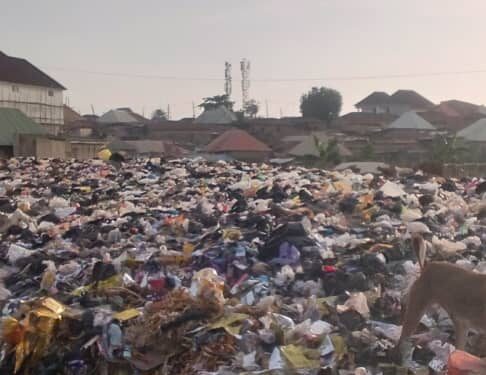By Adikwu Samuel Ebo
The ugly trend of indiscriminate waste disposal on roads, causing terrible traffic and posing health hazards to motorists and residents, has become alarming in the Federal Capital Territory (FCT), Abuja.
It is both an eyesore and an embarrassment that the FCT—the seat of Nigeria’s federal government—can now be described as one of the dirtiest capitals in Africa. The sight of refuse heaps and open defecation within the city paints a disturbing picture of neglect and poor sanitation management.
A recent on-the-spot assessment of the Nyanya–Kurudu–Karshi axis, where the minister recently undertook major reconstruction work, reveals an environment now overtaken by waste. The choking stench from refuse heaps along this route constitutes not only an environmental disaster but also a health menace to residents and commuters.
If indeed “cleanliness is next to godliness,” then many parts of the FCT are far from godliness. The unchecked pollution of air, land, and water through indiscriminate waste dumping is causing immense health challenges, including recurring cases of typhoid, malaria, diarrhea, dysentery, respiratory tract infections, and skin diseases.
In a functional society, waste should be properly managed, recycled, or converted into useful resources such as organic manure and biogas for electricity generation. Unfortunately, in the FCT, waste is mismanaged and turned into a public nuisance. Even worse, some refuse sites have become open defecation centers, exposing residents to deadly diseases like cholera and diarrhea as contaminated water sources flow into households.
The situation is compounded by scavengers who scatter waste indiscriminately, worsening the condition of dump sites. Many of their contaminated trucks are also used to transport food, water, and other household items to markets and restaurants—thereby recycling infections back into the community.
To address this menace, I advocate for the reintroduction of the War Against Indiscipline (WAI) policy, under which indiscriminate waste disposal would attract stiff penalties. In the past, environmental sanitation exercises were mandatory, with strict supervision and enforcement by public health officers and task forces. That discipline helped keep our cities clean.
Even more worrisome is the growing number of youths who now inhale toxic substances from waste materials as a means of intoxication—a self-destructive trend with devastating long-term health implications.
Sadly, all of these happen under the watch of agencies and officials—ministries of Health, Environment, and the FCT administration—who appear unconcerned. It is time for everyone—public servants, health professionals, industry leaders, politicians, and the clergy—to rise to the occasion and take collective responsibility.
Nigeria’s future in health, safety, and environmental sustainability depends on our moral discipline and commitment to public welfare. This is a clarion call for advocacy and public sensitization against random waste disposal, especially in public spaces.
The National Orientation Agency (NOA) must also take up this challenge to promote civic hygiene and public responsibility.
Finally, I urge the Honourable Minister of the FCT, His Excellency, Nyesom Wike, fondly called “Mr. Project,” to take bold steps to confront this menace head-on. The FCT should be the pride of the nation, not a symbol of decay.
There is much to be done to deliver the true dividends of democracy to the people.
— Adikwu Samuel Ebo
Public Affairs Analyst, Abuja.




































